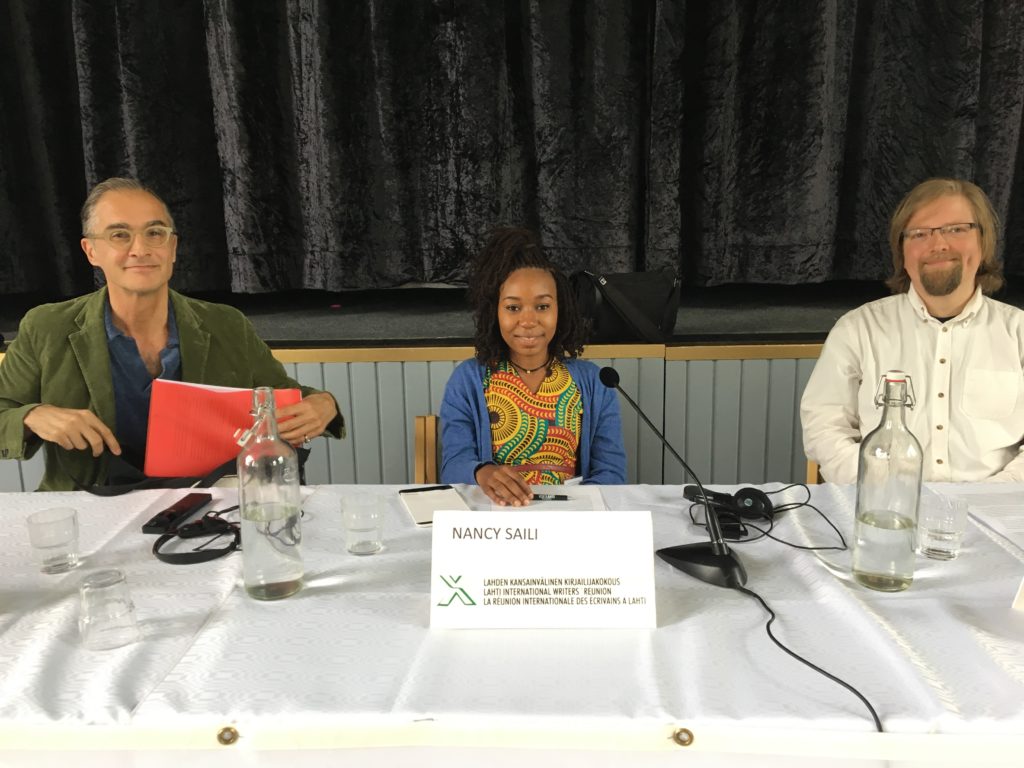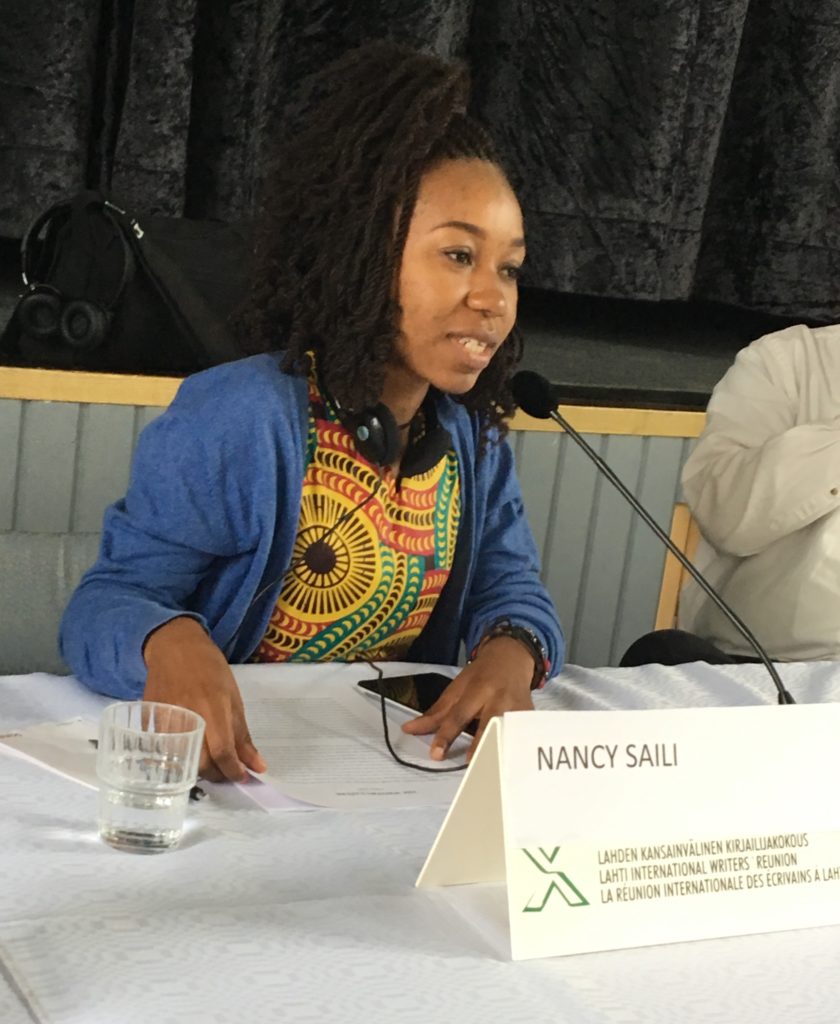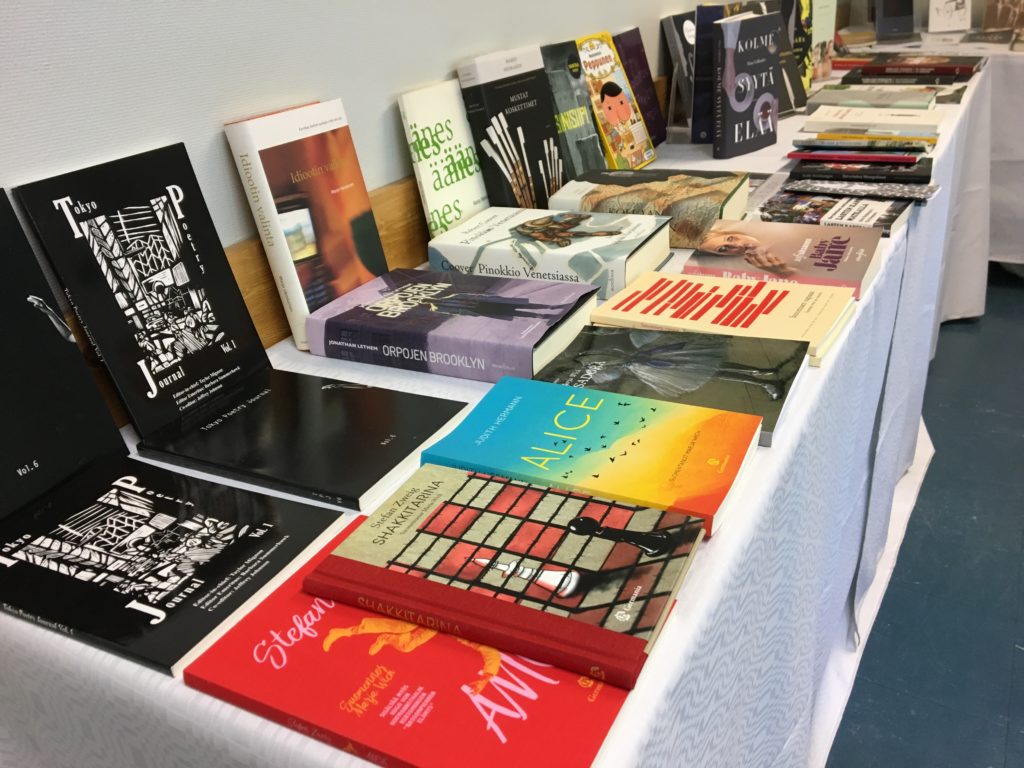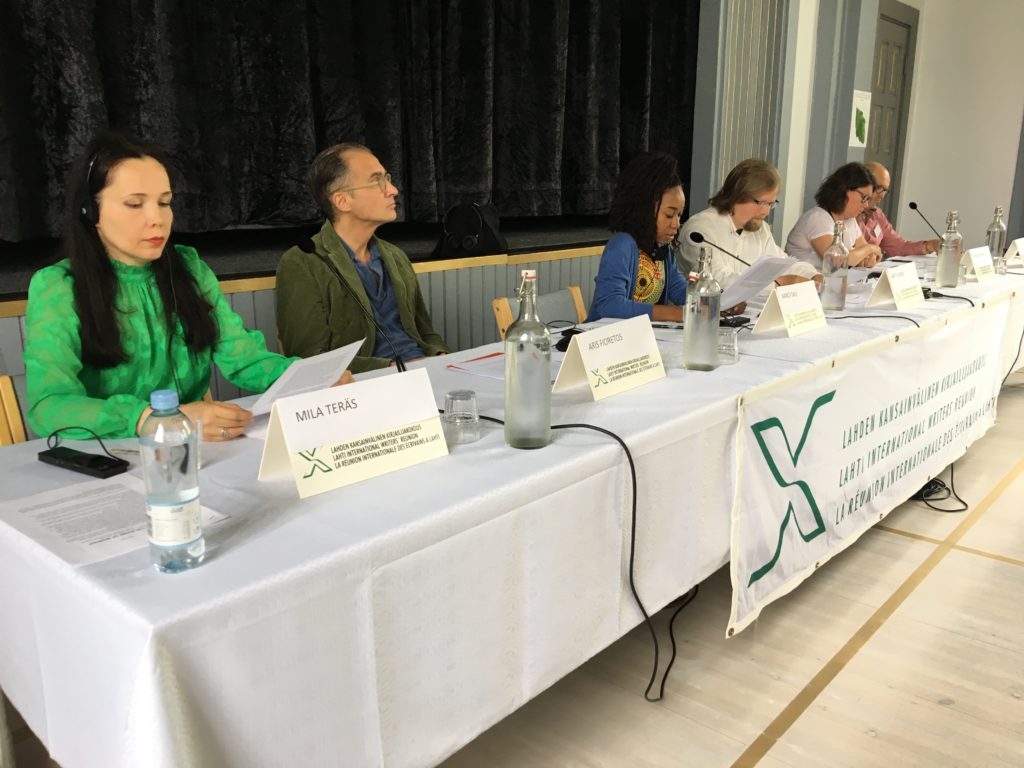Nancy Saili from Zambia is visiting Lahti International Writers’ Reunion as a guest of the Finnish PEN. This is her speech from Saturday. The speeches by all the participants can be found from https://www.liwre.fi/en/liwre2019-2/participants/
Sambialainen Nancy Saili puhui tänään Suomen PEN:in kutsuvieraana Lahden kansainvälisessä kirjailijakokouksessa. Tässä hänen alustuksensa. (Suomennos alempana.) Kaikki tapahtuman puheenvuorot löytyvät osoitteesta https://www.liwre.fi/liwre2019/osallistujat/
NANCY SAILI: IMAGINATION – THE WRITER’S NATURE
My mother was a teacher. She taught sign language. She loved to learn the translations of english words into sign language. Because the Zambian sign language syllabus was and is still developing, there’s always a new word to learn. When my mum learnt a new word, she would use it and use it and use it until it was tattooed in her memory and in everyone else’s. My mother suffered a form of throat cancer and in the months before she died she did not speak much because it caused her pain so her only form of communication with us was through sign language or to simply write. She preferred the earlier of course and I think the thing she loved most about sign language above all other languages was that it a very descriptive, creative and very imaginative form of communication. It not only tells but shows. Since the Zambian sign language vocabulary was quite weak, she had the chance to make up her own translations entirely from her imagination. I think also that it amused her to see people try to make up their own “very confusing” signs despite the fact she could hear us loud and clear.
What is the relevance of this story? Imagination. Imagination is the single most important thing to the process of writing. For writing to effectively communicate the writers thoughts and feelings imagination has to be at the root of it all. Without it would we even be able to effectively communicate with our readers? In writing we not only want to express ourselves but to communicate.Writers by nature are dreamers. I spend a lot of time daydreaming. Testing ideas. Having conversations in my head. Letting my mind wander of to explore where an idea might lead and trusting it to return with something. We as writers, create images in our imagination and writing is the skill that grants us the power to effectively transfer these images from our imagination into the imagination of readers through the use of language. A skill which when properly mastered makes the reader unaware of the words on a page. It allows the reader to be transported into the mind of the writer, to watch a story so brilliantly described as if it were playing out on a screen. Writing is a skill that allows us not only to tell but show. As Stephen King simply puts it, “Description begins in the writer’s imagination but should finish in the readers.”
An example of this is an article that was published in the Post newspaper in Zambia some years back. It was submitted by a man called Roy Clarke who was a contributor to the paper through a column called “The Spectator.” The article was entitled “Mfuwe” which is a town in the Eastern part of Zambia and is home to one of the largest National Parks. In his article he referred to the government at the time as a pack of animals. He described the then president as a “Fat Elephant.” The elephant was addressing his fellow animals in Mfuwe, in his speech he said he had nominated hippos to parliament, put jackals as administrators, that he had also put the “long-fingered baboons” in charge of the treasury and had further put the “hungry crocodiles” in charge of child welfare but best of all he said, he had gotten the pythons and they were now fully employed squeezing the tax payers. At that time I was a 6th grader that didn’t care much for politics. But what struck me was that I had never seen a fat elephant and as a reader it got me imagining and thinking. What really would it take to make an elephant fat? And just how many elephants were talking about? I will leave that to your imagination. In the same article, the elephant was further quoted saying “the heartless humans built schools and universities for themselves, but provided absolutely nothing for the animals in Mfuwe. By closing their schools we now have enough money to send our monkeys abroad to Harvard. They are studying for MBAs, degrees in manipulating budget allocations.” Again this opens up your imagination, and then maybe the annoying thing is not that we imagine that Harvard was accepting monkeys into its degree programs but what it does is that it exposed some sad facts about the ministry of education at the time. And so the rest of the article kind of followed the same line by describing different branches of the government and brought to light some very serious issues, that we would not have cared much about had we not looked at things from that angle. The article sparked a lot of debate and of course government was not happy but it was a lot to learn from. I am not sure the article is still available online.
So the world is constantly giving it self up for our imagination. We utilise our environments to create time, space and characters of the era in which we live in. And what we create often outlasts us, reminding future generations of the era that came before them and all that it stood for. We show the world not only as it is but as it could possibly be or otherwise should be.
I believe a writers responsibility is first to oneself. So that even if no one read our work there’d still be one person, just one person who benefits from it. We write mostly for ourselves. As we write we allow ourselves to become students of human nature. I often find myself discovering and learning a lot from my writing even the ones that no one will ever read. I spend a vast amount of time researching and developing characters from thoughts, feelings and actions. This form of learning is vital in the pursuit of personal growth.
However, writers also have a responsibility to others. American author MK Asante says, “When you make an observation, you have an obligation.” All writers posses the power of observation. We observe many things in the world around and beyond us, sometimes without meaning to. We listen, not only to what the world is saying but also to what it isn’t. We observe what it is doing and also what it isn’t.We take note and then we task ourselves with the duty to either, teach the world what we have learnt, or perhaps to expose a lie, or draw attention to a pressing issue. And this then becomes so important to us that we are compelled to share it. So for months or even years we crawl into a cave where we drink lots of coffee and waste a huge amount of trees. In there we sculpt a whole story, a script, a collection of poems just for the sheer purpose of teaching that lesson and hoping to be heard. In doing so, we pull out the important things in life and highlight them so the rest of the world has the opportunity of looking at the world from a different perspective.
I read somewhere that reading is like breathing in and writing is like breathing out. By this definition then, writing truly is the breath of civilization. As writers, our imaginations afford us the opportunity to use writing as a medium to alter, even by a small fraction, how people look at reality. In doing so we change mindsets, cultural behaviours and ultimately we change the world.
While anyone can sit down with a pen and notebook or laptop it requires a great deal to be a writer. For writing is more difficult for a writer than it is for everyone else but we choose it anyway. We choose it everyday. We choose it above all else and perhaps that is our most common denominator.

Kuvassa vasemmalta Aris Fioretos, Nancy Saili ja Kári Tulinius. 
Nancy Saili 
Lahti International Writers’ Reunion 
Lahti International Writers’ Reunion
NANCY SAILI: MIELIKUVITUS – KIRJAILIJAN LUONTO
Äitini oli opettaja. Hän opetti viittomakieltä. Hän piti kovasti siitä, että sai oppia miten englannin sanat kääntyivät viittomiksi. Koska sambialaisen viittomakielen sanavarasto oli ja on yhä kehitysvaiheessa, aina riittää uusia sanoja opittaviksi. Aina kun äiti oppi jonkin uuden sanan, hän alkoi heti käyttää sitä ahkerasti, kunnes se lopulta oli tatuoitu hänen ja kaikkien muidenkin muistiin. Äiti sairasti kurkkusyöpää eikä kuolemaansa edeltäneinä kuukausina puhunut paljonkaan, koska se olisi ollut niin kivuliasta, joten hänen ainoa tapansa kommunikoida kanssamme oli käyttää viittomakieltä tai sitten vain kerta kaikkiaan kirjoittaa asiansa. Ensin mainittu oli tietenkin mieluisin, ja luultavasti hän piti viittomakielestä enemmän kuin kaikista muista sen vuoksi, että se on hyvin ilmaisuvoimainen, luova ja mielikuvitukselle tilaa antava kommunikointimuoto. Se ei ainoastaan kerro, vaan myös näyttää. Koska sambialaisen viittomakielen sanavarasto oli varsin vaatimaton, hänelle tarjoutui mahdollisuus käyttää omaa mielikuvitustaan ja tuottaa aivan uusia käännöksiä. Häntä luullakseni myös huvitti katsella, kuinka me muut yritimme luoda omia “hyvin hämmentäviä” viittomiamme, vaikka hän kyllä kuuli aivan hyvin mitä me sanoimme.
Miten tämä tarina liittyy aiheeseemme? Mielikuvituksen kautta. Mielikuvitus on tärkein yksittäinen tekijä kirjoittamisen prosessissa. Jotta kirjoitus onnistuisi tehokkaasti välittämään kirjailijan ajatuksia ja tunteita, kaiken pohjana on oltava juuri mielikuvitus. Pystyisimmekö me ilman sitä lainkaan kommunikoimaan lukijoiden kanssa? Kirjoittaessamme emme halua vain ilmaista itseämme, vaan kommunikoida muiden kanssa. Kirjailijat ovat luonnostaan unelmoijia. Itsekin unelmoin paljon ja kaikenlaista. Kokeilen erilaisia ajatuksia. Käyn päässäni keskusteluja. Annan mieleni vaeltaa, kokeilen mihin jokin ajatus vie ja luotan siihen, että se palatessaan tuo jotain tullessaan. Me kirjailijat luomme hahmoja mielikuvituksessamme, ja kirjoittaminen on taito, joka antaa meille kyvyn siirtää nämä mielikuvitushahmot tehokkaasti lukijoiden mielikuvitukseen käyttämällä välineenä kieltä. Kun tämän taidon kunnolla hallitsee, lukija ei edes tiedosta näkevänsä sanoja sivulla. Sen avulla lukija pääsee vierailulle kirjailijan tajuntaan, katselemaan kertomusta joka on kuvattu yhtä loistokkaasti kuin jos se tapahtuisi valkokankaalla edessämme. Kirjoittaminen ei mahdollista vain kertomista, vaan myös näyttämisen. Stephen King ilmaisee tämän yksinkertaisesti näin: “Kuvaus alkaa kirjailijan mielikuvituksessa, mutta sen tulisi päättyä lukijan mielikuvituksessa.”
Maailma tarjoutuu kaiken aikaa mielikuvituksemme käytettäväksi. Käytämme ympäristöämme hyväksi luodessamme oman aikakautemme aikaa, paikkaa ja ihmishahmoja. Ja se mitä me luomme, elää usein meitä kauemmin ja muistuttaa tulevia sukupolvia heitä edeltäneestä ajasta ja sen pyrkimyksistä. Emme näytä maailmaa ainoastaan sellaisena kuin se on, vaan sellaisena kuin se voisi olla tai sen pitäisi olla. Minun mielestäni kirjailija on vastuussa ennen kaikkea itselleen. Vaikka kukaan toinen ei lukisi meidän teoksiamme, niistä silti hyötyisi ainakin yksi ihminen. Enimmäkseen me kirjoitamme itsellemme. Kirjoittaessamme meistä tulee ihmisluonnon opiskelijoita. Huomaan useinkin oppivani ja löytäväni kaikenlaista omista kirjoituksistani, niistäkin joita kukaan ei tule koskaan lukemaan. Kulutan valtavasti aikaa siihen että tutkin ja kehittelen henkilöhahmoja ajatuksista, tunteista ja teoista. Tällainen oppiminen on elintärkeää henkilökohtaisen kasvun kannalta. Mutta kyllä kirjailijoilla silti on vastuu muitakin ihmisiä kohtaan. Amerikkalainen kirjailija MK Asante sanoo: “Kun tekee jonkin havainnon, siitä seuraa velvoitus.” Kaikilla kirjailijoilla on havaitsemisen kyky. Havainnoimme monia asioita lähiympäristöstä ja kauempaa, usein ollenkaan sitä edes yrittämättä. Emme kuuntele ainoastaan sitä mitä sanotaan, vaan myös sitä mitä ei sanota. Havaitsemme mitä maailmassa tehdään ja mitä ei tehdä. Teemme huomioita, ja sen jälkeen otamme asiaksemme joko opettaa maailmalle mitä olemme oppineet tai paljastaa jonkin valheen tai kiinnittää huomiota johonkin tärkeään ajankohtaiseen asiaan. Tästä tulee meille niin tärkeää, että meidän on pakko jakaa se muiden kanssa. Niin me sitten ryömimme moneksi kuukaudeksi tai peräti vuodeksi luolaamme, jossa juomme paljon kahvia ja tuhlaamme valtavan paljon puita. Me muotoilemme siellä kokonaisen kertomuksen, käsikirjoituksen, runokokoelman, vain voidaksemme välittää opetuksen ja tulla kuulluksi. Nostamme esiin elämän tärkeitä asioita ja korostamme niitä, jotta muu maailma voisi tarkastella todellisuutta uudesta näkökulmasta.
Olen lukenut jostakin, että lukeminen on kuin sisäänhengitystä ja kirjoittaminen kuin uloshengitystä. Tässä mielessä kirjoittaminen todellakin on sivilisaation hengitystä. Kirjailijoina mielikuvituksemme suo meille mahdollisuuden käyttää kirjoitusta keinona edes vähäisessä määrin muuttaa ihmisten tapaa tarkastella todellisuutta. Näin tehdessämme me muutamme ajattelutapoja, kulttuurista käyttäytymistä ja viime kädessä maailmaa.
Kuka tahansa voi istua alas kynä kädessä tai asettua kannettavan tietokoneen ääreen, mutta kirjailijaksi ryhtyminen vaatii aika paljon. Kirjoittaminen on vaikeampaa kirjailijalle kuin se on kaikille muille, mutta se on kuitenkin meidän valintamme. Teemme tuon valinnan joka päivä. Asetamme sen kaiken muun edelle, ja kukaties juuri se onkin meidän yhteinen nimittäjämme.
Nancy Saili (Käännös: Laura Lahdensuu)
Nancy Saili on kirjoittaja ja aktivisti, joka asuu Solwezissa, Sambiassa. Hänen novellilleen The Enemy Within (Sisäinen vihollinen) myönnettiin Global Dialogues International Writing Contest -kirjoituskilpailun vuoden 2015 pääpalkinto. Nancy Saili on osallistunut 2014 Young Cinema in Zambia -hankkeeseen, kirjoittanut käsikirjoituksen lyhytelokuvaan Minibus ja opiskellut dokumenttielokuva-alaa American Film Societyssa Sambian USA:n lähetystön kautta. Hän kirjoittaa novelleja ja runoja ja viimeistelee parhaillaan uutta novellikokoelmaa.
